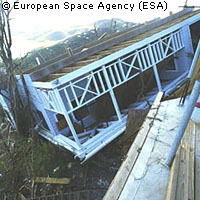MEPs call for more research into earthquakes
MEPs have adopted a report calling on the Commission to draw up a strategic research agenda on earthquakes and on turning Europe's seismic areas into 'open-air laboratories' for research purposes. The report, drafted by Greek MEP Nikos Vakalis (EPP-ED), also recommends that Member States step up their research into ways of preventing damage, managing crises and reducing the impact of earthquake disasters, in tandem with the Seventh Framework Programme (FP7). It adds that both the Commission and Member States should encourage setting up centres of excellence in scientific, technological and architectural innovation, as well as university courses in such disciplines as earthquake-related engineering. According to Mr Vakalis, contrary to common belief Europe is very vulnerable and at a high risk of earthquakes. Although the EU's most seismically active areas are Italy, Greece, Romania, Bulgaria, Cyprus and Slovenia, the report claims Germany, Austria, the Czech Republic, France, Spain, Portugal and Malta also face a significant risk. In addition, large areas of the EU are also subject to mining-related rock-mass tremors, which cause similar damage. However, despite a high level of technical expertise in the field, the EU makes far fewer investments in research and development (R&D) into new technologies than other seismic regions such as Japan, China and the US. 'It is very important to maintain and increase the EU's seismic expertise. This expertise may be turned into a successful and exportable commodity, and seismic regions may be converted into open-air laboratories, thereby making capital out of this handicap,' he writes. The rapporteur goes further, suggesting coordination should not only take place at the European level, but also with third countries neighbouring the EU. 'Cooperation should take place at various levels: initially there should be a technology transfer and an exchange of best practices with countries developing the relevant expertise. In the second place, there should also be technical cooperation, with the objective of responding to earthquakes more effectively,' he said. In addition, the report calls on the European Commission to draw up a communication on earthquake hazards, damage prevention, management and repair and a technical protocol for joint action by the EU in the event of earthquake disasters. The document would focus on critical transport, energy, telecommunications and health infrastructures, and on the roles of national, regional and local authorities.



